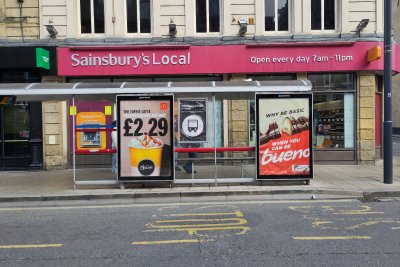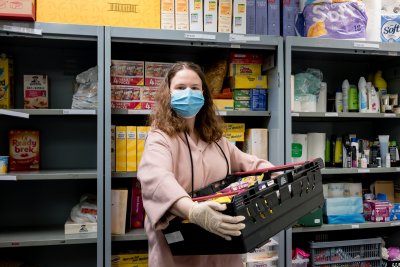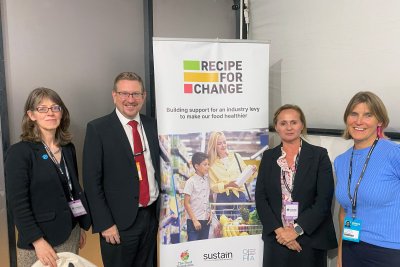- TeamGB sponsor Kellogg’s #GreatStarts Olympic advert campaign found to have broken advertising rules.
- Advertising Standards Authority criticised for taking lax approach to major marketing campaigns and for failing to enforce its own rulings.
- Health campaigners warn that reformulation gains are at risk without action on marketing and promotions.
For the second time since July [3], the Advertising Standards Authority has found that Kellogg’s broke EU rules and made misleading health and nutrition claims when marketing its sugary cereals. On this occasion it was Kellogg’s #GreatStarts Olympics ad campaign, which ran from April to August 2016, and misleadingly claimed that a bowl of cereal or snack bar high in sugar was a ‘great start to the day’ and ‘fuel for success’. [2]
Children’s Food Campaign also examined the company’s competitions and giveaways aimed at families and found the entry codes were primarily available on ‘less healthy’ products, and the website pointed to promotions mainly on those products. [4] Kellogg’s also failed to mention the sugar content of its products on its webpage dedicated to discussing the nutritional content of its (often sugary) children’s cereals. [5]
Malcolm Clark, co-ordinator of Children’s Food Campaign, said:
“Kellogg’s has a worrying addiction to promoting its high sugar cereals and snack bars over those lowest in sugar. This isn’t a great start to their sugar reduction commitments. The drastic improvement needed in children’s diets won’t happen unless companies such as Kellogg’s significantly cut the sugar in all their products which appeal to or are consumed by children, and also change the way they market and promote those products in the first place.”
“In the meantime, if parents cannot trust the advertising regulator to pro-actively keep an eye on the most high profile marketing campaigns, or to penalise companies who repeatedly break its rules, then who can they turn to? The Government has made the wrong decision by leaving it wholly to industry to set and police its own marketing rules. It’s not too late for the Prime Minister and the Secretary of State for Culture, Media and Sport to change their minds and add measures on junk food marketing restrictions back into the Childhood Obesity Plan.”
For interviews, and for further information, please contact:
Malcolm Clark, coordinator, Children’s Food Campaign
malcolm@sustainweb.org.uk / 0773332148 / 0203 5596 777 / @childrensfood
Notes
1) Public Health England sugar reduction industry meetings
As part of the Government’s Childhood Obesity Plan, published in August 2016, Public Health England (PHE) were tasked with leading a sugar reduction programme. The Plan states that the food and drinks industry "will be challenged to reduce overall sugar across a range of products that contribute to children's sugar intakes by at least 20% by 2020, including a 5% reduction in year one". The programme will initially focus on the nine categories that make the largest contributions to children's sugar intakes: breakfast cereals, yogurts, biscuits, cakes, confectionery, morning goods such as pastries, puddings, ice cream and sweet spreads.
Today, Friday 4 November, PHE will holds its first meeting specifically on reducing sugar in breakfast cereals will be held.
2) The complaint against Kellogg’s #GreatStarts Olympics advertising campaign
Kellogg’s launched their #GreatStarts advertising campaign on 27 April 2016, 100 days before the Rio Olympic Games started.http://www.thedrum.com/news/2016/04/26/kellogg-s-team-gb-olympics-push-kicks-redgrave-smith-and-adlington-sharing-their
Children’s Food Campaign submitted a complaint to the Advertising Standards Authority about unsubstantiated general health claims and misleading use of the terms 'nutritious', ‘great start’ and ‘fuel for success’ on Kellogg’s Olympics promotional websiteshttps://heroday.kelloggs.com/uk/ andhttp://txtwin.kelloggs.com/uk/.
On 12 September 2016 the ASA wrote back to confirm they had looked into the matter under Regulation (EC) No. 1924/2006 on nutrition and health claims made on foods as reflected in the Committee of Advertising Code. The ASA said: “we consider that the terms you mentioned would be likely to be considered to be references to the general benefits of the foods for overall good health or health-related well-being. As such, the Regulation, and therefore the CAP Code, requires that the general health claims must be accompanied by a specific health claim.”
The ASA found “that at the time CFC submitted its complaint neither of the two web pages included a specific health claim. However, when they checked the websites on 16 August, as part of the review of the case, they had been amended to include such approved claim (Vitamins B1, B2, B3, B6, B12, iron, magnesium and phosphorus contributes to normal energy-yielding metabolism). We consider the ads are now compliant with the CAP Code and that neither a formal investigation nor any further action is required or would be proportionate at this time.”
NB full correspondence and screenshots available on request from Children’s Food Campaign.
3) Successful complaint against Kellogg’s Special K – July 2016
On 20 July 2016 a complaint against ads for Special K cereal was upheld by the ASA, who banned the ads from being shown again. The ads had failed to include approved health claims to support the general claim they made of the cereal’s ‘nutritious’ benefits. “The ASA asked the brand to ensure that future campaigns use relevant authorised health claims to accompany any general health claims they make.”
But the ASA did not at that time look at whether Kellogg’s other existing campaigns were in compliance or not. And even once they found evidence (via the #GreatStarts complaint above) that other campaigns had indeed committed similar breaches of the code, there were no further sanctions or reprimands handed out by the ASA.
4) Kellogg’s online competitions and giveaways
Many of Kellogg’s print and online adverts for its family and child-orientated competitions and giveaways predominately feature cereals and other products which are defined as ‘less healthy’ and/or high in sugar. The same is true for the products and promotions featured on the company’s website.
As recorded on 27 July 2016, on https://heroday.kelloggs.com/uk/ listed in a special ‘online promotions’ box on that page there were 46 different promotions, for 25 different
products. Of those 88% of the products and 93% of the promotions were for 'less healthy' - ie HFSS - products - as defined under the FSA/Ofcom nutrient profiling model. For more info:https://www.sustainweb.org/news/aug16_rio2016_obesitygames/ [note 2]
As recorded on 2 November 2016, on https://playball.kelloggs.com/gb, 5 out of 6 of the products featuring codes to collect in order to receive a free Playball are high in sugar and classified as ‘less healthy’.
NB screenshots available on request from Children’s Food Campaign
5) Sugar not mentioned on Kellogg’s children’s nutrition page
In the nutrition section of Kellogg’s website, it has a page dedicated to “the 3 nutrients at the heart of a Kellogg’s kids breakfast”, but fails to mention anywhere on the page about sugar – let alone the fact that some of its cereals aimed at children have a high sugar content.
http://www.kelloggs.co.uk/en_GB/nutrition1/nutrients.html
NB screenshot available on request from Children’s Food Campaign
6) Children’s Food Campaign
Children’s Food Campaign aims to improve children and young people's health by campaigning for policy changes in our schools, in our communities and throughout our society that would promote healthy and sustainable food environments. The Children's Food Campaign is supported by over 100 UK-wide and national organisations, including public health professional bodies, trade unions, school food experts, children’s charities and environmental groups. We are a campaign of the charity Sustain: the alliance for better food and farming. www.childrensfood.org.uk
7) Obesity Health Alliance
The Children's Food Campaign is also a member of the Obesity Health Alliance (OHA) - a coalition of over 30 organisations committed to share expertise and support Government to tackle the issue of overweight and obesity in the UK.http://obesityhealthalliance.org.uk
Children's Food Campaign: Better food and food teaching for children in schools, and protection of children from junk food marketing are the aims of Sustain's high-profile Children's Food Campaign. We also want clear food labelling that can be understood by everyone, including children.








